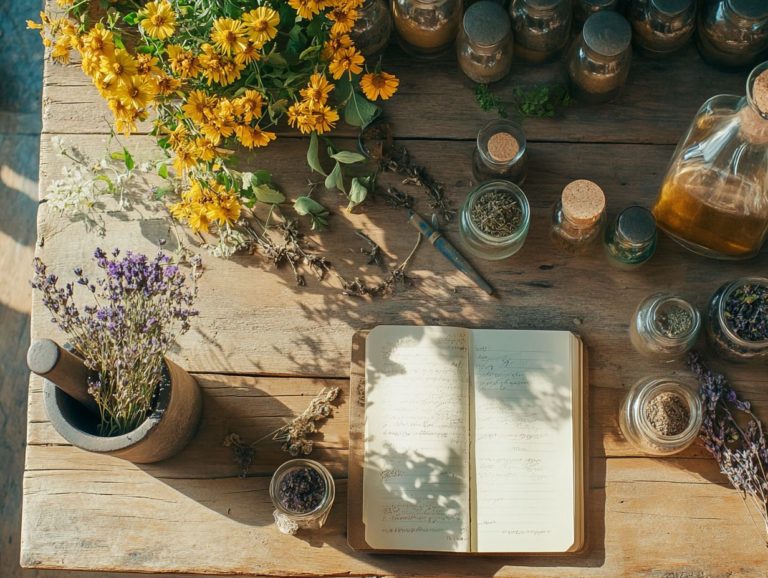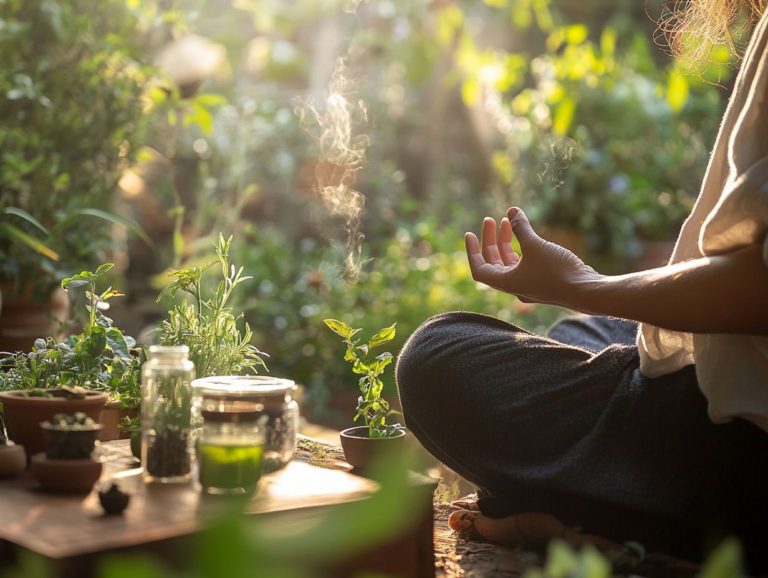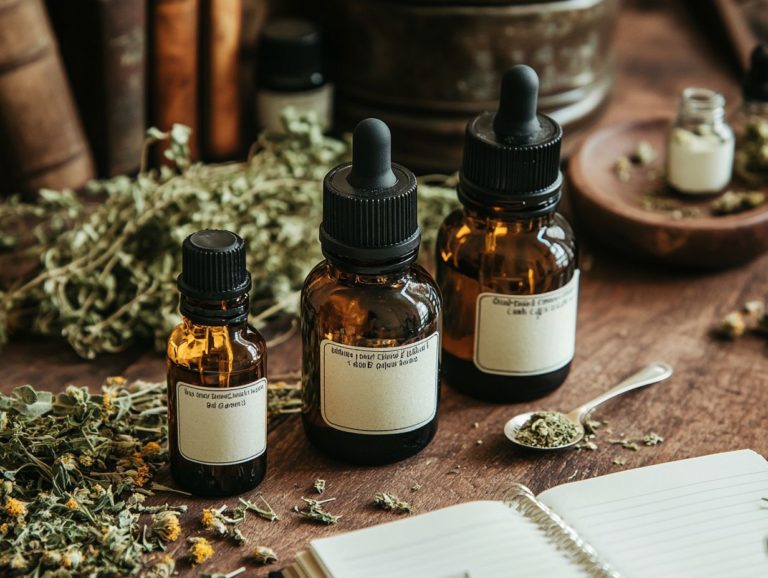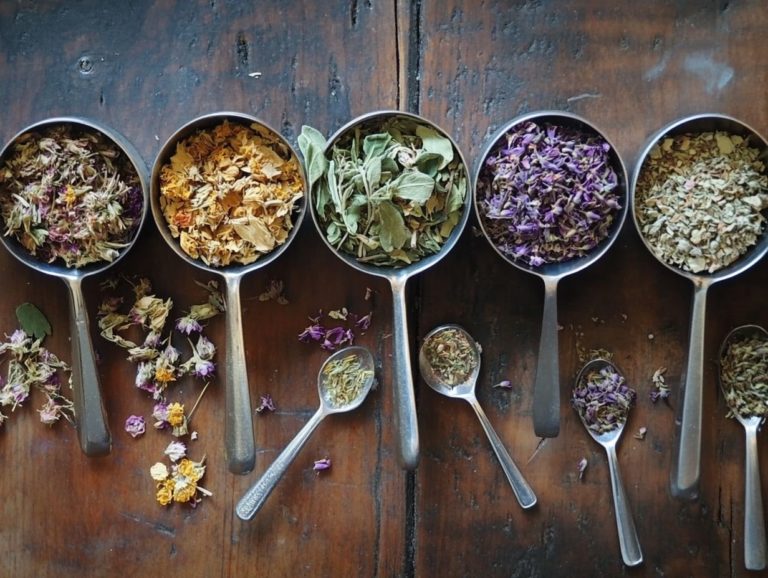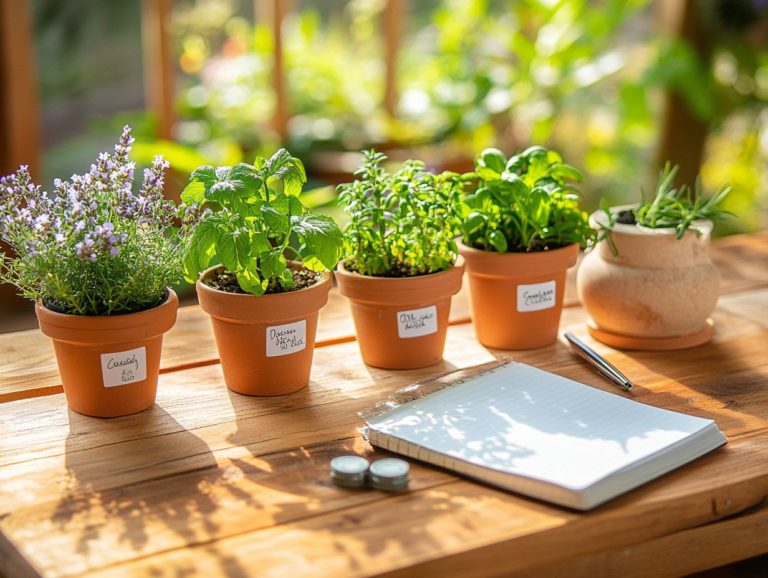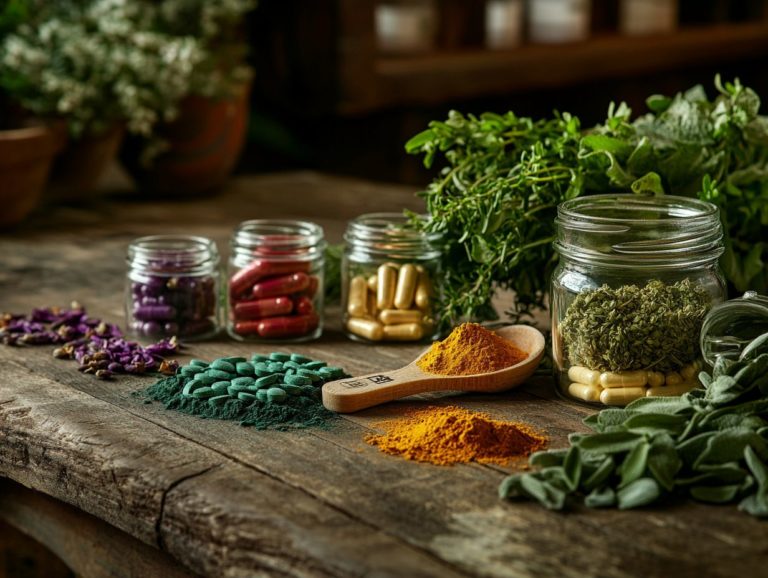Safety Protocols for Herbal Extraction and Dosage
Dive into the world of herbal extraction! Herbal extraction is essential for unlocking the benefits of nature s remedies, yet grasping the importance of proper dosage, particularly with herbal supplements, is equally vital for both safety and effectiveness.
This guide delves into the essentials of herbal extraction, highlighting best practices for herbal products and safety protocols. It examines the various factors that influence dosage and provides specific recommendations for popular herbs.
Whether you are a seasoned herbalist or just dipping your toes into the world of herbal medicine, this information offers valuable insights for ensuring safe and effective herbal use.
Contents
- Key Takeaways:
- Essential Safety Tips for Herbal Extraction
- Factors Affecting Herbal Dosage
- Dosage Recommendations for Common Herbs
- Frequently Asked Questions
- What are safety protocols for herbal extraction and dosage?
- Why are safety protocols important for herbal extraction and dosage?
- What are some common safety protocols for herbal extraction?
- Can herbal extraction be dangerous if safety protocols are not followed?
- Is it necessary to consult a professional when extracting and dosing herbs?
- Are there any specific safety protocols for children or pregnant women when it comes to herbal extraction and dosage?
Key Takeaways:

- Proper extraction techniques are crucial for maintaining the safety and efficacy of herbal remedies. Guidelines include using the correct equipment and following specific procedures to ensure quality and purity.
- Individual factors, such as weight, age, and overall health, should be taken into consideration when determining the appropriate dosage of herbs. Interactions with other substances should also be considered.
- Dosage recommendations for popular herbs may vary, so it is important to consult reliable sources and take into account special considerations for vulnerable populations, such as children and pregnant women.
What is Herbal Extraction?
Herbal extraction is a careful method that allows you to draw out beneficial compounds from medicinal plants, utilizing methods that harness the plant’s natural properties for both internal use and topical applications. This practice is deeply rooted in traditional herbal medicine, where entire plants or specific parts are transformed into concentrated liquid extracts, herbal formulations, or brewed as tea.
Each of these forms offers a diverse range of health benefits through various herbal products. One popular method you might encounter is tincture preparation, where alcohol serves as a solvent to extract the active constituents, resulting in a potent extract that’s easily dosed. It’s also important to consider how the environment affects herbal dosage safety, as discussed in this detailed guide. Alternatively, herbal teas provide a gentler approach, infusing herbs in hot water to release their flavors and benefits, all while delivering a comforting drink.
These methods not only preserve the essence of the plants but also enhance how well your body absorbs the nutrients. The importance of herbal medicine in wellness is increasingly acknowledged as it integrates natural remedies into daily life, promoting a holistic approach to health.
Why is Proper Dosage Important?
Proper dosage is essential in both herbal medicine and herbal supplements, ensuring you achieve the desired therapeutic effects without inviting adverse reactions or toxicity. This is especially important for those using dietary supplements. Familiarizing yourself with the recommended dosages, as outlined by FDA regulations and guidelines, can greatly enhance the effectiveness of herbal remedies while minimizing the risks associated with self-medication.
Incorrect dosing can lead to a spectrum of side effects, from mild irritations to more severe health complications, particularly when these supplements interact with prescription and over-the-counter medications. For example, certain herbal ingredients might amplify the effects of anticoagulants (medications that help prevent blood clots) or influence blood pressure, creating significant risks if you’re not vigilant. Therefore, understanding the importance of safety in herbal medicine and consulting a healthcare provider becomes essential in navigating these complexities.
It s vital to closely adhere to the recommended guidelines printed on supplement labels to ensure safe and effective use. This diligence not only promotes a better understanding of your health choices but also enables you to make informed decisions for your well-being.
Essential Safety Tips for Herbal Extraction
Establishing common safety protocols for herbal extraction is essential to ensure the quality and purity of herbal products, effectively safeguarding users against potential health risks. With herbal supplements gaining traction in the market, implementing rigorous toxicity evaluations and addressing standardization issues becomes crucial.
This approach enhances the integrity of herbal medicine and bolsters consumer confidence in its safety, especially when following balancing herbal remedies: dosage guidelines.
Guidelines for Proper Extraction Techniques
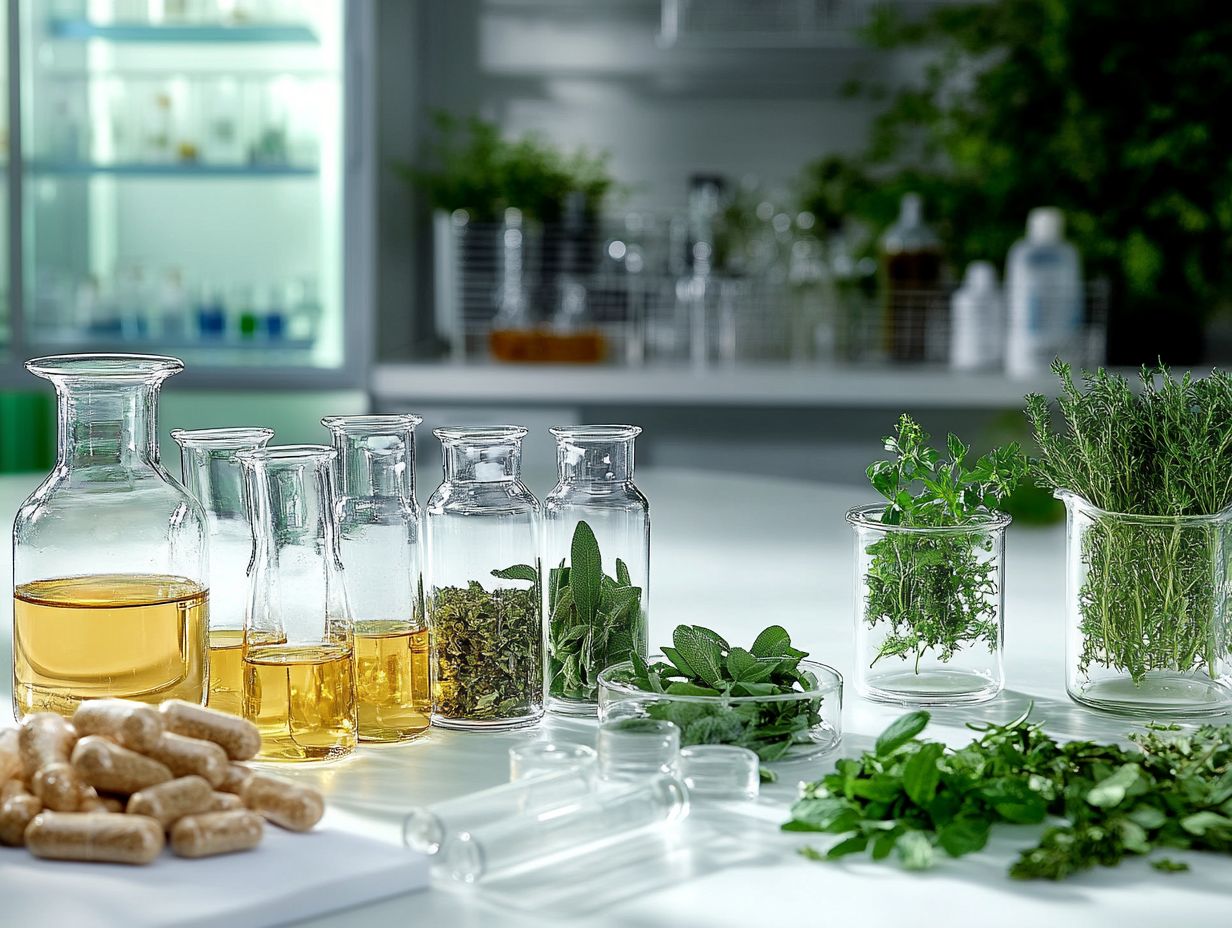
Adhering to proper extraction techniques is essential for maximizing the benefits of herbal formulations and ensuring the effective extraction of valuable compounds from medicinal plants. Techniques such as concentrated liquid extracts or brewing methods significantly influence the potency and efficacy of herbal products. It is crucial to follow established guidelines.
Take cold pressing as an example. This technique extracts oils and essences without heat, retaining their delicate properties and beneficial compounds. Steam distillation is another popular method, especially for volatile oils; it uses steam to separate aromatic molecules, resulting in a highly concentrated product.
Solvent extraction captures a broader spectrum of plant chemicals by dissolving a plant s active ingredients in an appropriate solvent. However, exercise caution to ensure that residual solvents do not compromise safety.
Each method has its advantages and disadvantages, highlighting the importance of selecting a technique that best preserves the health benefits of the herbs you re using.
Ensuring Quality and Purity
Ensuring the quality and purity of herbal products is paramount in herbal supplements and medicines, as it directly influences their safety and effectiveness. Embrace rigorous quality assurance processes to verify that herbal ingredients are free from toxic compounds and meet industry standards for purity. This diligence guarantees reliable herbal remedies.
You can employ various methods, such as laboratory testing, to meticulously examine the active constituents of the herbs while checking for contaminants like heavy metals and pesticides. Sourcing herbs from reputable suppliers who adhere to stringent quality control practices is crucial for your peace of mind. For safe consumption, consider following 5 essential tips for safe herbal use. Regulatory agencies like the FDA play a pivotal role in monitoring product safety, implementing guidelines that manufacturers must follow.
By ensuring proper testing protocols are in place, you can enjoy greater confidence in the efficacy and safety of the herbal products you choose and their alignment with FDA regulations.
Factors Affecting Herbal Dosage
Determining the right dosage of herbal supplements involves several factors. Consider your unique characteristics and circumstances.
Your age, weight, health conditions, and any medications you are currently taking can significantly influence how herbal remedies interact with your body. This interplay can affect the effectiveness of the supplements and heighten the risk of adverse reactions. For those new to herbal remedies, it’s crucial to refer to herbal preparations: dosage tips for beginners to ensure safe usage.
Individual Factors to Consider
When determining the right dosage of herbal supplements, it s crucial to consider individual factors like age, weight, overall health, and any pre-existing chronic conditions.
These elements can profoundly impact how your body processes herbal ingredients and the effectiveness of the remedies. For instance, if you are elderly, you may experience a slower metabolism and altered absorption rates, which can increase your sensitivity to certain herbal supplements. This often necessitates careful dosage adjustments.
Chronic conditions like hypertension or diabetes might negatively interact with certain herbal supplements, complicating your treatment plan. Evaluate these factors carefully to ensure your health doesn t suffer.
By understanding these nuances, you pave the way for better health outcomes and empower yourself to make informed decisions about your wellness journey.
Interactions with Other Substances
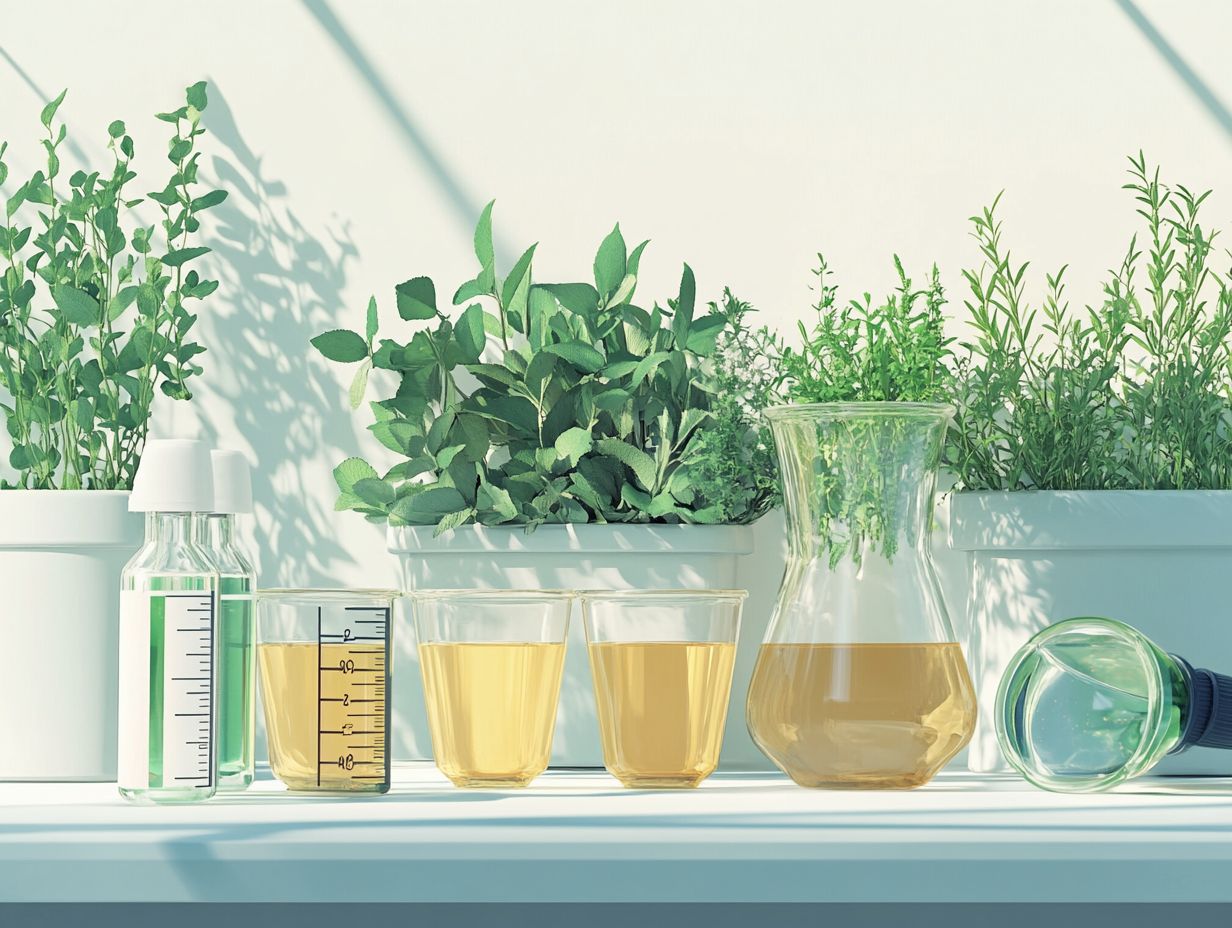
Understanding the interactions between herbal supplements and other substances, such as prescription medications and over-the-counter remedies, is vital to avoid negative effects when combining drugs. Herbal remedies can enhance or inhibit the effectiveness of conventional medications. Always consult healthcare providers before blending these treatments.
These interactions are particularly significant with popular herbal supplements like St. John’s Wort, which can reduce the effectiveness of certain antidepressants, leading to treatment failures. Some supplements, such as garlic and ginkgo biloba, may affect blood clotting when taken with anticoagulants, which are medications that help prevent blood clots, raising safety concerns.
Managing these interactions effectively helps you maximize treatment efficacy and ensures your overall health and safety. If you’re considering herbal supplements, close monitoring and professional guidance are vital for navigating potential interactions.
Dosage Recommendations for Common Herbs
Dosage recommendations for common herbs are crucial guidelines for anyone looking to harness the therapeutic benefits of herbal supplements safely. By understanding the appropriate dosages for herbs like Echinacea, garlic, and ginkgo, you can maximize their health benefits while minimizing risks.
Dosage Guidelines for Popular Herbs
Understanding dosage guidelines for herbs like Echinacea, garlic, and ginkgo is essential for safe and effective use. These guidelines can vary depending on how the herb is taken, whether as a concentrated extract or brewed tea.
For instance, Echinacea is generally suggested in doses of 300 to 500 mg of dried root, taken three times a day to boost your immune function. Garlic, known for its heart benefits, is often used in aged extract, with dosages around 300 to 1,000 mg daily for optimal results.
On the other hand, ginkgo biloba is best taken in doses of 120 to 240 mg daily, divided into two or three doses for brain support. Correct usage can significantly enhance the effects of each herb, making precise dosage crucial for desired health benefits. For more information on the proper methods and dosages, refer to our guide on understanding herbal extraction methods and dosages.
Special Considerations for Children and Pregnant Women
Special dosage considerations are crucial for children and pregnant women. These groups can react differently to herbal ingredients, so following established herbal medicine guidelines and consulting a healthcare provider is essential for safety and effectiveness.
Herbs like chamomile and ginger are generally safe in moderate amounts for pregnant women and children, offering potential relief from nausea and promoting calm. However, some herbs, like blue cohosh and comfrey, pose risks during pregnancy and should be avoided.
Understanding the specific needs of these groups is key to safe herbal usage. Seek advice from a qualified herbalist or healthcare professional to navigate the complexities of herbal safety practices and ensure well-being for expectant mothers and young children.
Frequently Asked Questions
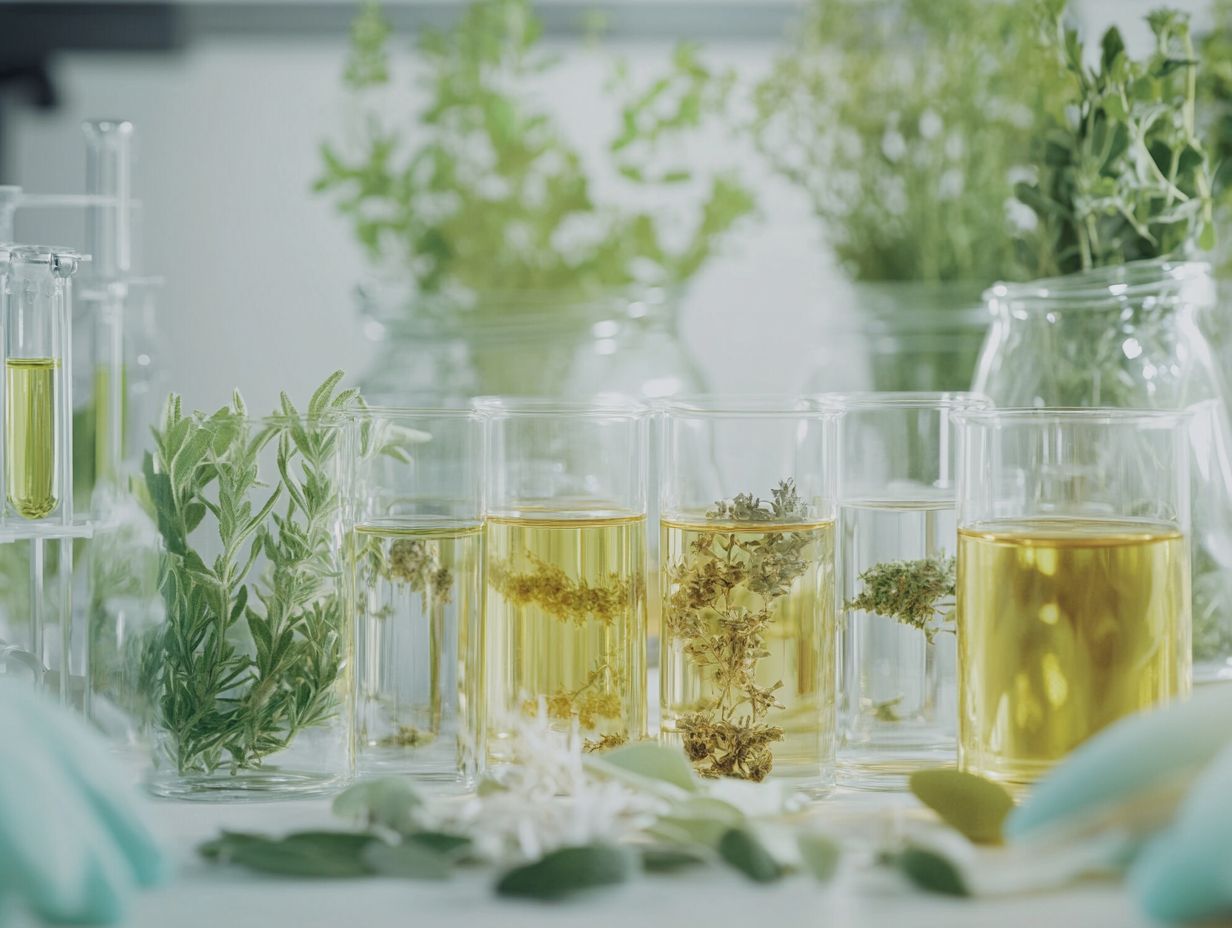
What are safety protocols for herbal extraction and dosage?
Safety protocols guide the safe extraction and use of herbal remedies. They ensure proper handling and dosing to prevent health risks and side effects.
Why are safety protocols important for herbal extraction and dosage?
Safety protocols are crucial because herbs can contain strong compounds that may interact with medications or health conditions. Proper measures help avoid adverse reactions and guarantee herbal effectiveness.
What are some common safety protocols for herbal extraction?
Common safety protocols include wearing protective gear and properly identifying herbs. Always follow established extraction methods and dosage guidelines.
Can herbal extraction be dangerous if safety protocols are not followed?
Yes, it can be dangerous! Improper handling can lead to allergies, drug interactions, or toxicity, so following safety protocols is key to avoiding these risks.
Is it necessary to consult a professional when extracting and dosing herbs?
Always talk to a professional for the best advice on herbs! They can guide you on safe extraction methods and potential medication interactions.
Are there any specific safety protocols for children or pregnant women when it comes to herbal extraction and dosage?
Yes! There are specific protocols for children and pregnant women. Always consult a healthcare provider before giving herbs to them, as some may not be safe.

